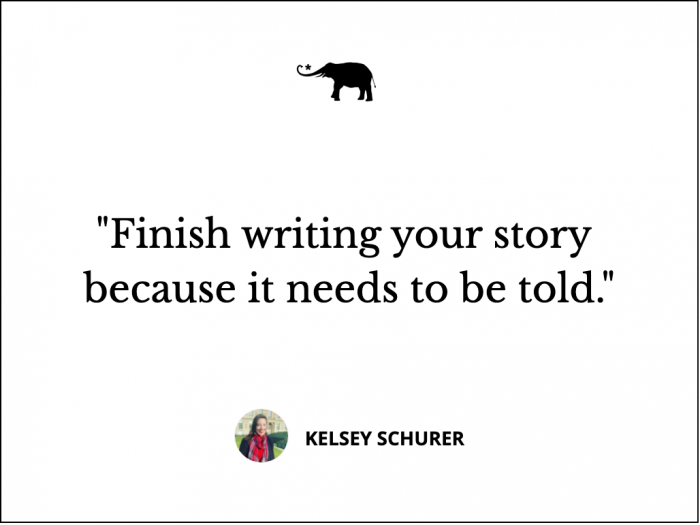I’m not going to lie—writing a book from start to finish is a scary process.
Although it varies for every writer and book, the majority of the time, writing a book feels like walking through the dark woods when there’s only a flicker of candlelight to illuminate the path. It’s often a labor of love, an intensely demanding experience both emotionally and mentally. Writing a book is a lot more time-consuming than many authors expect at the outset.
As much as we all would like our words to spill seamlessly from our minds to the page, it seldom works that way.
As Oscar Wilde supposedly said, “I spent all morning taking out a comma and all afternoon putting it back in.”
And as hard as it can be to get started writing a manuscript, we often find ourselves feeling freer to express our creativity in the early stages—when the spark of ideas is strong and we know that every word we write is part of a work in progress.
A rough draft can always be changed (or even tossed) if we aren’t satisfied with the way it’s coming out. There’s less pressure to get every word just right.
Nearing the end of a manuscript, however, feels different. Although there is satisfaction in having come so far from the first page, there’s also a feeling of exhaustion—a daunting feeling of “when will this ever end?”
The hard truth is that writing a book means being immersed in the project over a long period of time.
After spending so much time and energy in the book’s world, we tend to lose our sense of perspective just when the excitement of starting a new, creative project is wearing off. This makes it challenging to stay motivated and finish writing the book. At a certain point in the book writing process, we begin to see the book fully—the little flaws and irritabilities we overlooked now feel complicated, and sometimes even too much.
This happens to every writer at some point along the way to finishing a manuscript. Many of us slow down our writing or stop altogether because we begin to realize, really realize, that people will read it—all the thoughts, emotions, ideas, and messages we have inside us that are now outside and on the page!
Yes, that has been the goal all along, but it had remained a bit of a fantasy in our minds until we neared the end of the writing process. Now, the woods feel darker, and thoughts of fear circle in: “What if nobody likes what they read? What if my book is a failure?”
Despite the fear, most often there’s no valid excuse to delay finishing. The book deserves to be written. And yet, we still try to bargain with ourselves. If we could just spend a little more time on it, we could make it perfect. Thus, everyone will read it and love it—and the work will be immune to criticism—a masterpiece, the next great American novel! So we slow down, revise one more time, make another round of final changes, and remove the comma only to put it back in place…whatever it takes to stave off the moment of reckoning.
Here is how to finish writing that book in four steps.
If you’ve started writing your book, you’ve already achieved more than most people who might have ideas for a book, but never put a single word on a page. And if you can start, you can finish writing that book.
You just need more candlelight to get out of the woods and onto the other side. Here are some strategies I’ve used myself to help finish writing that story:
1. Take an artful break.
It might seem counterintuitive, but consider taking a break from writing if you’re struggling to finish. Pushing through when you’re burned out seldom produces material you want to keep, so take time to rest and reenergize. Often, I will take an “artful” break, which means I’ll step away from writing, but still engage in something creative to keep me in that world of possibility.
This might be taking a meditative walk in nature, picking up a paintbrush, or listening to music. These keep your creative muscles warm without pushing yourself to the point where you dread returning to your writing.
Breaks are also good to reflect on what you’ve written and where you have left to go. Many people who started writing a book during the coronavirus pandemic have found themselves needing a break just to mentally process everything that has happened in the past year and a half.
When you give yourself the mental and emotional space your mind, body, and heart are asking for, you’ll come back with a new perspective on what you’ve written. You might be surprised how much easier it is to finish writing your book when you return to it after time away.
2. Seek feedback from those you trust.
Be thoughtful about who you choose to read or review your manuscript and articulate exactly what kind of feedback you’re looking for. Because the act of writing a book is so tender and sacred and messy and scary, many writers tend to pick those closest to them to share their book for the first time. And while those people can be excellent readers for heartfelt validation, they’re often unsure of how to provide feedback you can act on to make the manuscript the best it can be. They’re also likely to feel protective of you and thus avoid saying anything that might truly hurt your feelings—even if it’s honest feedback.
If you don’t have a complete manuscript yet, consider finding a developmental or structural editor to do an honest and constructive assessment. These editors are experienced in evaluating how the book unfolds and will pay attention to literary elements such as plot, structure, language, logical flow, tension and pacing, and sensory details and subtext. Editors can offer concrete suggestions for bringing your manuscript together and tightening up loose ends.
In other words, get an expert opinion. Not only will it help you create a better manuscript, but knowing that your work has been professionally vetted can also give you the confidence boost you need to keep going.
3. Find a writing coach.
If you’re feeling overwhelmed, consider hiring a book writing coach to support you in finishing those final chapters of your book. Author coaching can be tailored to your needs, whether you’re looking for someone to bounce ideas off of, cheer you on, or keep you accountable to the writing goals and deadlines you’ve set for yourself.
Scheduling a weekly meeting with your coach can be very motivating, as you know that someone is always there with you along the way.
I would also urge you to talk to other authors or find lectures and talks by your favorite writers to absorb stories about how they finished writing their books. Nothing centers me quite like knowing I’m not alone, that there are so many professional writers out there who also struggle to finish their manuscripts. You’ll discover that you are in good company and that countless others have overcome the inertia of those final pages.
It’s encouraging to hear that every process is different, but the outcome remains the same: getting the pleasure of typing “the end.”
4. Put that comma back in and stop writing!
There comes a time when you’ve done your due diligence and it’s time to stop writing and hand the work over to someone who can give your book the fresh eyes it deserves. There’s no sense in becoming Oscar Wilde, removing a word here and adding a bit of punctuation there. At some point, you’ve got to stop tinkering and give the manuscript to someone who can polish it for you, such as a copy editor or proofreader.
Once you hand it over, that doesn’t mean you’re done writing for good, by the way. If you’re like most authors, when you’re ready to type out that final sentence, you’ll already be thinking about starting your next book.
Finish writing your story because it needs to be told.
When you feel unable to finish writing your book, you might feel like a failure. You aren’t. Books require a massive amount of thought and effort, not to mention heart and soul. And if you’ve started a book, you’ve likely poured all of the above into every sentence. That kind of love doesn’t just go away, but like rocket fuel, propels you forward until you finish the last page.
You might be wondering whether the struggle of finishing writing your book is worth it. It absolutely is. As any first-time author will tell you, there is nothing quite like opening a box of books and seeing your name on each cover. And you’ll never tire of hearing readers say, “This book changed my life!”
Imagine, for example, that Jane Austen never finished Pride and Prejudice, or Brené Brown never finished writing Rising Strong. The world would have missed out on incredible works about empowering women and the beauty of what it means to follow one’s intuition—in other words, to help countless people understand who they are, what they want most, and how to improve their lives.
When you’re in the trenches, it’s easy to believe you’ll never fulfill the promise you made to yourself when you first decided to write your book from start to finish. But, keep going. Otherwise, the world will never get to benefit from hearing your story—and that would be a shame.











Read 0 comments and reply